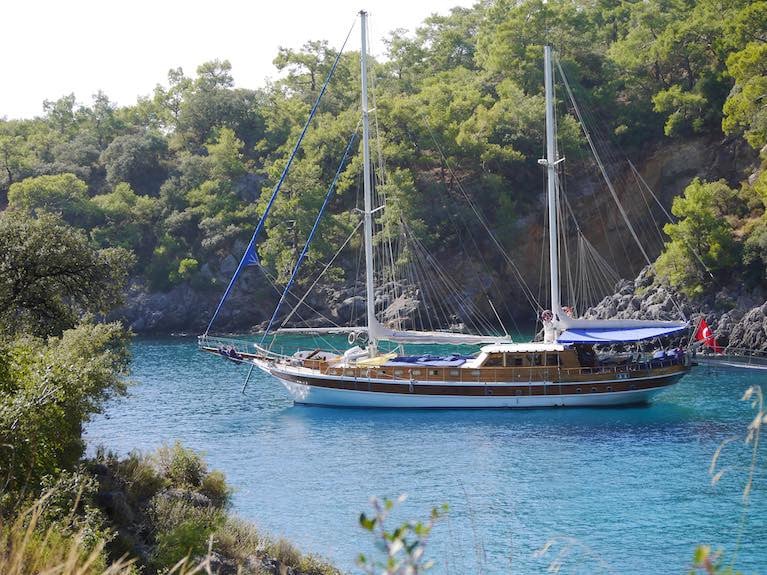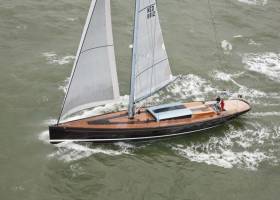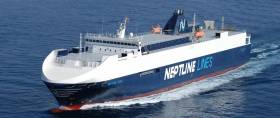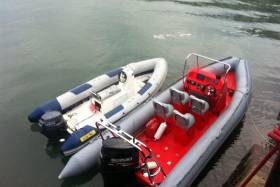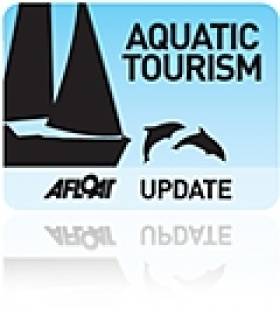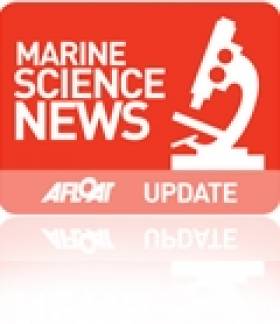Displaying items by tag: Charter
Chartered Bore Song Sails into Dublin Port Prior to Starting Stena Line's 'Permanent' Freight Ferry
Bore Song, the 25,586 gross tonnage ro-ro freight ferry that Stena Line has chartered for Irish Sea service, completed its repositioning voyage from Lübeck, Germany, to Dublin Port this afternoon, writes Jehan Ashmore.
On arrival in Dublin Bay at 1330 hours off the Muglins Lighthouse, Dalkey, the port’s pilot cutter, DPC Tolka, transferred a pilot to the Bore Song in the southern approaches to the bay.
The near-3,000 freight-lane-meter-capacity vessel owned by Bore Ltd. of Helsinki, Finland, is to operate as the ‘permanent’ vessel on Stena Line’s newly opened Dublin-Birkenhead route. The introduction of such a ship on this basis will give hauliers confidence and security of capacity.
Afloat sought a timeframe for the charter, which begins next week, 15 April; however, Stena declined to make any further comment on the specific details of the arrangement involved in the use of the 210 trailer unit vessel built in 2011 by FSG, Flensburg, Germany.
The central corridor route linking Ireland and England is currently served by Stena Nordica and was previously run by Stena Horizon, which launched the freight-only route in mid-February following the withdrawal in December of the P&O Ferries route, albeit based out of Liverpool Dock, linking the Irish capital.
Earlier in the week, Afloat tracked the Bore Song between Denmark and Sweden, offshore of Varberg, a former Stena Line port on the Kattegat, and then caught up with the vessel in the southern North Sea.
At that time, Wednesday evening, when in the westbound shipping lane approaching the Strait of Dover, offshore of Ramsgate, Kent, was in the vicinity, the Finnwave, another ro-ro freight ferry that had departed Zeebrugge, Belgium, and is operated by Finnlines (Grimaldi Group), was bound for Rosslare Europort.
It was not until yesterday, 2100, that Bore Song had reached the other end of the English Channel, off Land’s End, Cornwall, before heading into the Celtic Sea.
On arrival at Dublin Port, the tug Beaufort, which had been waiting at the former ESB Poolbeg oil jetty, moved away to assist the 195-metre vessel into berth at Terminal 5, which flanks the port’s eastern estate on the north side of the Liffey. The terminal was where P&O operated but is now also used by CLdN Ro Ro S.A., which also operates upriver out of Terminal 3 and at berths along Ocean Pier.
Tonight, Bore Song is scheduled to depart, so to carry out further berthing trails at Birkenhead (Twelve Quays) Terminal, Stena’s north-west England hub-port, with passenger and freight routes to Belfast.
With the Bore Song in Irish waters, it was observed that the freighter retained its owner’s livery scheme; however, given that this ro-ro is the permanent vessel, Stena Line will no doubt at the very least change the funnel colours.
Bore Song’s owners, Bore Ltd are part of the Dutch Spliethoff Group, which includes Transfennica, whose con-ro Timca was until last month on a short-term charter to the ICG/Irish Ferries routes of Dublin-Holyhead and from the Irish capital connecting Cherbourg, France.
The Timca is one of six of the ‘Splietoff’ class con-ro vessels built in Poland.
From 2022, Bore Song was chartered to Transfennica, operating from Lübeck to Paldiski, Estonia, where the route on the Baltic Sea remains in the service of twin, Bore Sea.
Get Married on a Private Crewed Charter Gulet in the Sun in Turkey
2020 was deeply frustrating for those many couples planning to get married as their plans kept being altered by ever-changing COVID regulations. Legions of boat owners also found their racing and cruising plans frustrated.
One local couple managed to resolve both issues concurrently by holding their wedding celebrations on board the family gulet in Turkey in October 2020, creating an event which will live in the memories for all the participants for a long time.
 The happy couple on the stern of gulet ‘Salamander’
The happy couple on the stern of gulet ‘Salamander’
A gulet is a traditional Turkish sailing vessel with voluminous, luxurious accommodation and great stability, hence an ideal holiday for a mix of sailing enthusiasts and those more apprehensive around boats. And contrary to common opinion, gulets do indeed sail when the wind direction and strength are suitable. Typically all the large cabins have their own bathrooms en suite, and there are many relaxing areas both on and below deck, in and out of the sun. Imagine the comfort and service levels of an excellent boutique hotel but with the scenery constantly changing, going where you choose, and loaded with paddleboards, kayaks, sailing dinghies and snorkelling gear.
Juliet Cooke from County Antrim and her boyfriend Alex were in Northern Ireland from their base in Edinburgh to collect a car when they were accidentally but fortuitously locked down in her family's holiday home on Strangford Lough. They arrived in late March, ended up staying for six months, and became engaged there in April.
The initial plans for a sizeable wedding at the holiday home in 2021 were soon abandoned as it became clear that the future for weddings was no less certain than the present, and much smaller weddings were the only alternative to an indefinite postponement.
Juliet's parents suggested using their beloved 26-metre Turkish gulet 'Salamander', which they have run as a successful fully crewed private charter business for some 17 years. Although they usually are fully booked for 26 weeks a year with family groups of up to 12 guests from all over the world celebrating significant birthdays, anniversaries or just enjoying the turquoise waters in the Aegean, there were inevitable unexpected gaps in 2020 season as travel advice kept changing, and several groups of guests had to postpone their voyages on Salamander. A suitable gap for wedding celebrations suddenly emerged!
 Turkish gulet Salamander coming alongside gulet Aganippe in preparation for the wedding ceremony
Turkish gulet Salamander coming alongside gulet Aganippe in preparation for the wedding ceremony
Despite a common misconception, it is not legal for the Captain to marry a couple on board his ship in most countries, so a modified plan was hatched accordingly. Alex and Juliet were able to get married in accordance with the prevailing lockdown regulations in Northern Ireland with a small church wedding for just the two families, followed by an outdoor champagne reception. One week later, the ever-tightening regulations would have prevented this happy event taking place!
 Toasting the arrival of the wedding couple
Toasting the arrival of the wedding couple
Then on to the main event. Three weeks later they held their wedding celebrations in Turkey for over three days. 'Salamander' housed the Cooke family and a 30m gulet, 'Aganippe', which is also offered for private charter by Salamander Voyages, was used by Alex's family and a few friends. 'Salamander' was fully dressed for the wedding in bougainvillaea and greenery. Both gulets were moored tightly alongside each other in a quiet bay for the ceremony, which included vows, readings and even a couple of hymns. The participants were on the aft deck of 'Salamander', and the guests alongside on the aft deck of 'Aganippe'.
 The Bride emerges from the gulet saloon
The Bride emerges from the gulet saloon
After a champagne reception, both boats motored to the delightful small village of Cokertme, where a restaurant had been prepared with the dining table on the beach and dancing on the balcony. The superb food was provided by the two gulet chefs, who occupied the restaurant kitchen for the evening.
 Wedding dinner table dressed for action ashore
Wedding dinner table dressed for action ashore
The guests came from all over the UK and Ireland, Turkey and even Serbia. Inevitably the different nationalities wished to display their prowess at their national dancing after dinner, and even a nearby forest fire did not disturb the celebrations.
 The bridal walkway with both private charter gulets anchored off
The bridal walkway with both private charter gulets anchored off
The happy couple then set off on a smaller gulet for a short honeymoon while the guests slowly meandered back to Bodrum for their flights home. Ryanair's direct flight from Dublin to Bodrum was a real boon for the Northern Irish guests, who then did 14 days of quarantine buoyed up by very special memories. Salamander Voyages' claim of 'probably the safest place in the sun' was indeed well made.
 Waiting for the wedding guests at Orhan’s restaurant in Cokertme
Waiting for the wedding guests at Orhan’s restaurant in Cokertme
The restrictions of lockdown were the inspiration for a truly memorable wedding celebration
Salamander Voyages is happy to assist other couples wishing to get married away from the vagaries of Irish weather in the sun in southern Turkey, as well as their more normal fare of providing private groups of up to 12, with wonderful voyages of discovery in the sun with exquisite food on a highly inclusive basis. They offer a small number of different carefully selected gulets to match groups of different sizes. They even offer one specialist gulet in Turkey which can comfortably accommodate a private party of up to 22 guests. Prices start from around €1200/head excluding flights.
Salamander Voyages also offer gulet charters in Montenegro.
If you want to know more about private gulet holidays in Turkey or Montenegro for up to 22 guests visit the website at www.salamandervoyages.com or please call Tessa on +44 7887 874886
Superyacht ‘Tulip’ Berths In Dun Laoghaire Marina
#Tulip - Dun Laoghaire Marina yesterday (Friday 13 July) welcomed the arrival of the K&M superyacht Tulip for a brief visit.
Designed by German Frers Jr and launched in 2012, the luxury 88-footer has the appearance of a classic sloop above the water line, but below has a flat hull and rising keel that makes for top racing performance when required.
Tulip usually plies the gold and blue coasts of the Mediterranean, can be chartered with a crew of two and room for up to six guests across its three cabins — if money is no object.
#FerryNews - Stena RoRo's charter of a vessel to P&O Ferries Dublin-Liverpool route ended at the weekend following the return of European Endeavour fresh from annual refit, writes Jehan Ashmore.
The charter of Stena Carrier to rivals, P&O was expected to terminate tomorrow, however the ro-ro freight ferry Stena Carrier completed duties earlier with a passage from Liverpool to Dublin on Sunday morning. Following discharging of vehicles, the ship proceeded to anchor in Dublin Bay also that morning (and remains so off Dun Laoghaire Harbour). Afloat awaits the next charter possibly on the North Channel?
Also on Sunday, as alluded P&O's European Endeavour, the largest of three ferries on the Liverpool route, arrived into Dublin Bay fresh from overhaul carried out at A&P Falmouth, Cornwall.
Upon arrival in Dublin Port, European Endeavour, remained in port for a scheduled Sunday layover. A first post-refit sailing departed yesterday albeit some two hours late. The returning sailing from Liverpool in comparison arrived on time to Dublin this morning. Several hours later at 15.00 the ferry departed on schedule with an arrival on Merseyside tonight at around 23.00.
Afloat will have more on the 24,046 gross tonnage, European Endeavour, in the meantime, the focus remains on Stena Carrier which in February provided a replacement vessel out of Rosslare. On that occasion, Stena Line required the services of the charter company, part of the Stena Sphere of companies, that is based in Gothenburg. The west Swedish city is where ferry company is also located.
Some principle characteristics of Stena Carrier (below) of the '4runner' class built. Among them, leadship Stena Forerunner which operates the ferry division's North Sea route: Harwich-Rotterdam (where CLdN's ro-ro recently christened Celine calls to as part of an Ireland-Belgium-UK-Netherlands route diagram).
Stena Carrier
Flag: Denmark
Port of Registry: Frederikshavn
Built: 2004
Gross Tonnage: 21,171
Deadweight: 11,783
Drivers: 12
Lane meters: 2,715
Length Overall: 182.77m
Breath Extreme: 25.50m
Draught: 6.10m
As alluded above the stint on Stena Line's Rosslare-Cherbourg service saw Stena Carrier continue in a freight-only mode (notably with livestock, estimated to be 35,000 cattle) while ropax Stena Horizon was routinely drydocked.
At that stage no passenger services were operating between the countries, except for Irish Ferries ropax Epsilon on the Dublin-Cherbourg route.
There is much anticipation of newbuild cruiseferry, W.B. Yeats onto the capital-continental connection. The 55,000 gross tonnage cruiseferry is encountering delays at the German yard of FSG, Flensburg and is not expected to enter service until late July as widely reported in the media.
#Charter -A Maltese flagged Greek owned vehicle-carrier only vessel is on charter to an Irish Sea ferry operator while its ships take refit dry-docking turns in the UK, writes Jehan Ashmore.
The chartered-in Neptune Aegli can handle 1,800 cars or 1,550 lane metres of truck/trailers has begun a first sailing today for P&O Ferries. This involved an afternoon crossing from Dublin to Liverpool.
Neptune Lines operates a fleet of 16 Pure Car & Truck Vehicle Carriers (PCTC) from which Neptune Aegli joins P&O’s European Endeavour and ropax Norbay. Noting sister, Norbank this morning entered a dry dock at Cammell Laird, Birkenhead. The shipyard and marine engineering facility located on the Wirral Peninsula is opposite to Liverpool Docks.
It is a year ago when Afloat reported on the charter to P&O of Neptune Aegli. On this current charter, the 2002 built PCTC had docked in Dublin yesterday having assisted P&O operations on the North Sea. This saw the ship provide freight support relief duties for Hull-Zeebrugge ferries sisters, Pride of York and Pride of Bruges that underwent multi-million career-extension refits.
The annual refits of the North Sea 32,000 tonnes sisters took place in Gdansk, Poland, where work on the near 900 passenger each cruiseferry involved overhauls of shops, catering experience outlets and cabins and bars will now have hotspot wi-fi. In addition the extensive upgrade was carried out throughout facilities for freight customers on the UK-Belgium route.
Pride of York when launched from Govan Shipbuilders on the Clyde as Norsea in 1986 was the largest ever passenger ship built in the UK since Cunard Line’s Queen Elizabeth dating to 1969.
The famous trans-Atlantic ocean liner had too been built on the banks of the Clyde but from the John Brown yard.
Motorboat Hire: Rent a RIB on Dublin Bay
Ever wanted to rent a Rigid Inflatable Boat (RIB) for a blast on Dublin Bay? Here's your chance. The Irish National Sailing School's 4.5m RIBTECs fitted with Yamaha 40hp engines are ideal for trips around the capital's waters. Included in the price of a three hour charter at €115 is a full tank of fuel.
The operating area for these boats is Dublin Bay, south of the shipping lane and as far East as Dalkey Island. The minimum qualification required to rent the boat is a National Powerboat Certificate (Level 2).
For more details on the offer check out the listing on Afloat's Marketplace here.
Eddie Jordan's Superyacht Available To Charter
#Superyacht - Irish F1 supremo Eddie Jordan certainly pulled out all the stops when he caught the yachting bug, commissioning the largest recreational vessel ever built by luxury specialists Sunseeker.
And now his €40-million, 155-foot superyacht Blush, which was launched earlier this year, is available to charter over the winter months.
But as Motor Boat & Yachting reports, you'll need a sizeable bank balance to avail of this offer, as prices start at a whopping €200,000 for just seven days on board the luxury vessel.
More details from Sunseeker on Jordan's mansion-on-the-waves are available to read or download HERE.
Business Brisk in Dun Laoghaire for Charter Yachting Company
#LEARN TO SAIL - Charter yacht trip firm GoSailing.ie is weathering the recession, as the Sunday Business Post reports.
The venture - which provides daily and corporate yacht excursions since setting up in 2000 - reacted to a shortfall in customers due to the changing ecomonic climate by relocating from Westport to Dun Laoghaire marina, where business has been brisk.
Aaron O'Grady, a veteran of the Irish Olympic sailing squad, started the business with his father Pauric, the duo investing in a 54-foot yacht The Explorer to run sailing trips off the Mayo coast, helping novices learn to sail.
They later teamed up with business manager Bref Kennedy, who says that the recreational sailing business has plenty of room to grow.
"Our main goals are trying to break the perception of sailing that pervades in Ireland and also to introduce people to the exciting world of sailing on the extremely under-used and beautiful coastline that exists right on our doorstep," said Kennedy.
GoSailing is also the only company providing a charter yacht service on the east coast, according to Kennedy, which is "amazing considering we are an island nation".
Charter yachting trips around Dublin Bay, Killiney Bay and Dalkey Sound typically go for around €35 a head for groups of 12. For more details visit GoSailing.ie.
Bilbao Returns to Baltic Sea 'Roots'
For the last 17 years the Pride of Bilbao has operated between Portsmouth and Bilbao under charter to P&O. Built in 1986, she was launched as Olympia for Viking Line between Stockholm and Helsinki, then the Baltic Sea ferry was one of the largest overnight passenger capacity ferries in the world. At 177 metres long the vessel can accommodate 2552-passengers, 600-vehicles and space for 77-trucks. She has a sister, the Mariella, which currently operates on Viking Line's Stockholm-Mariehamn–Helsinki service.
In 1993 the vessel was renamed Pride of Bilbao and launched a new service on the Bay of Biscay, under charter from her Scandinavian owners. The following year ICG purchased the Pride of Bilbao from Viking Line and she was re-registered to the Bahamas. The vessel was subsequently entered into a British bare-boat charter arrangement between P&O Ferries and ICG. Due to unsustainable losses the route closed on 28 September this year but rivals Brittany Ferries soon shortly announced they would reopen the route in Spring 2011.
Throughout the Pride of Bilbao's career under ICG (parent company of Irish Ferries), the cruiseferry has only once visited Ireland. In between Spanish sailings, she was sub-chartered for a three-day Christmas mini-cruise from Portsmouth to Dublin in 2004, where the Pride of Bilbao berthed at the ferryport close to the ICG headquarters.
Minister Smith said "I am delighted to sign today a new Accord on Marine Research between Newfoundland and Labrador and the Irish Authorities. The initiative involves a partnership approach between the Fisheries and Marine Institute of Memorial University of Newfoundland and Ireland's Marine Institute including the charter of the state-of-the-art research vessel 'Celtic Explorer'. Both Institutes have strong capabilities in ocean technology and research. Through this alliance, there is now an opportunity to bring the strengths of both Institutes to greater levels".
Minister of State Connick added that "The proposed EU Atlantic Strategy under the EU Integrated Maritime Policy and the support for a Joint Programming Initiative on Healthy Seas & Oceans recently announced by Ms. Máire Geoghegan-Quinn the European Commissioner for Research, Innovation and Science, highlight the increasing importance of linking the scientific challenges on both sides of the Atlantic."
Welcoming the chartering of the RV Celtic Explorer, Mr Clyde Jackman, Minister for Fisheries and Aquaculture – Newfoundland said "It will enable our academic institutions to take their already world class research to the next level and support a state of the art fishing industry that is based on better science. This initiative will create many new opportunities for young Newfoundlanders and Labradorians, as a result of a more vibrant fishing industry and in conducting fisheries science research".
"Thanks to the support of our Provincial Government, the Marine Institute of Memorial University of Newfoundland is further positioned to play a vital role in the future of fisheries in Newfoundland and Labrador. With the chartering the RV Celtic Explorer and the creation of our new Centre for Fisheries Ecosystem Research the Marine Institute is further positioned to play a vital role in fisheries science research in our province," said Glenn Blackwood, the Executive Director of the Fisheries and Marine Institute of Memorial University of Newfoundland.
"Research lead by personnel from the Centre for Fisheries Ecosystem Research and conducted aboard the RV Celtic Explorer will help develop a better understanding of the state of Newfoundland and Labrador's fish stocks and the dynamics of its marine ecosystems, providing new information to support better decisions." he said.
"The strong alliance the Marine Institute, Ireland has with the Fisheries and Marine Institute of Memorial University of Newfoundland will enable transatlantic collaboration to support the rapidly expanding fisheries research programmes in Newfoundland waters" said Dr Peter Heffernan, CEO of the Marine Institute.
"We are delighted with this opportunity to work with such a prominent team of fisheries scientists and we look forward to exploring with our Newfoundland colleagues how we can also build stronger links as part of a wider international ocean observation initiative to study the Gulf Stream and North Atlantic Drift. This could link SMART technology to monitor climate change and environmental conditions in both Irish and Newfoundland waters and stimulate commercial spin off opportunities."
"Projects linking technologies, equipment and expertise on both sides of the Atlantic would therefore enhance Ireland and Newfoundland's capability to perform in the forefront of scientific endeavours as our strategic geographic location demands," he further added.
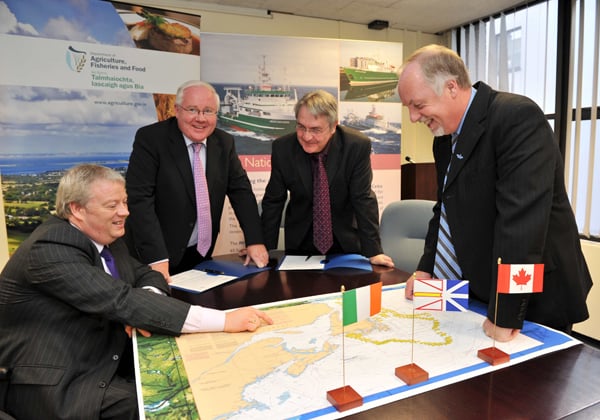
Brendan Smith TD, Minister for Agriculture, Fisheries and Food and Sean Connick TD, Minister of State at the Department of Agriculture, Fisheries and Food signing an accord with their Newfoundland counterparts Minister Clyde Jackman and Deputy Minister Alastair O’Reilly In Agriculture House.



























